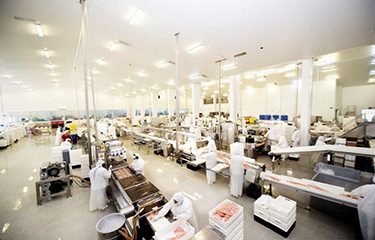Chile's salmon farmers are responding to rising consumer demand for corporate environmental stewardship, a trend they say has accelerated during the COVID-19 pandemic.
A number of Chile's top salmon farmers and their suppliers have recently announced steps to make their operations more sustainable, including Salmones Camanchaca, Multiexport Foods, and netting manufacturer Badinotti Group.
Salmones Camanchaca recently signed a two-year fish feed supply agreement with BioMar and Skretting, looking to proactively improve management of the environmental and social risks associated with its value chain. The initiative outlines four specific targets:
- To formulate diets employing raw materials that have not contributed to native deforestation anywhere in the world.
- To establish greenhouse gas reduction targets under the guidelines from the Science Based Targets initiative.
- To use 100 percent renewable energy.
- To implement the life-cycle analysis method, which selects ingredients for fish diets based on reducing overall environmental impact.
Skretting and Biomar have committed to specify targets, establish deadlines and KPIs, and provide accreditations where applicable by the end of March.
“Feed production is a significant component of the social and environmental footprint of salmon farming, due to the wide range of raw materials and supply chains involved in this process,” Salmones Camanchaca Sustainability Manager Alfredo Tello said in a release. “Actively contributing to the sustainable development of salmon farming requires working in partnership with our food suppliers, and this commitment is a big step in that direction.”
Skretting Global Sustainability Director Trygve Berg Lea highlighted Skretting’s parent company Nutreco’s worldwide commitment to establishing science-based targets to reduce greenhouse gas emissions, as well as the fact that Skretting Chile has recently signed an agreement for its power suppliers to provide 100 percent renewable energy. The company has also engaged in initiatives involving health and welfare, climate, circularity, and good citizenship that will support Camanchaca in reaching its target of becoming carbon neutral by 2025.
“Our business uses internal processes that reduce water and fuel use, and focus on reducing and reusing materials such as plastic and pallets. We monitor our CO2 emissions and our carbon footprint, and regularly report them to our head office in Norway,” Skretting Chile CEO Ronald Barlow said. “We are planning a major investment in 2021, which will optimize the use of thermal energy based on alternative sources. All these initiatives aim to reduce our impact on the environment and demonstrate our commitment and our achievements within the global aquaculture industry supply chain.”
Further, BioMar has been analyzing its feed life-cycle for several years in order to make well-informed sourcing decisions, according to BioMar Group Global Sustainability Director Vidar Gundersen. That effort has helped it commit to Salmones Camanchaca's sustainability targets, which include a pledge to achieve carbon neutrality by 2025 for its Scope 1 and Scope 2 emissions under the Greenhouse Gas Protocol. The pillars of its new sustainability model are built on issues including encouraging prosperous communities and healthy ecosystems.
Following suit, Multiexport Foods announced that, in 2020, its processing plant, located in the city of Puerto Montt, stopped sending waste altogether to landfills, thereby fulfilling the objective of its “Zero Waste to Landfill” program begun in 2017.
Through this program, Multiexport has begun incorporating processing plant waste into its circular economy model. The repurposed processing plant waste was equivalent to more than 15,500 metric tons (MT) in 2020 alone, and more than 57,500 MT since the beginning of the “Zero Waste to Landfill” program.
“As a company, we have established sustainability at the center of the business, and in that sense the promotion of a circular economy model is key, as it has a direct relationship with environmental stewardship and contributing to the well-being of society,” Multiexport Foods Sustainability and Corporate Affairs Manager Francisco Lobos said. The idea is to maintain this trend, with the company having begun to replicate the program in the farming division and in support areas, he added.
Chilean aquaculture netting manufacturer Badinotti Group has also upped its environmental commitments. Last year, it presented an environmental impact statement (EIS) to Chile's Environmental Assessment Service (SEA) for a USD 4.5 million (EUR 4.1 million) project to build a wastewater treatment plant.
The plant would be located in the Cabo Negro sector of the city of Punta Arenas to treat industrial liquid waste coming from the process of Badinotti Net Services Magallanes’ washing, disinfecting, maintenance, and impregnation of nets, local publication SalmonExpert reported.
Photo courtesy of Multiexport Foods







